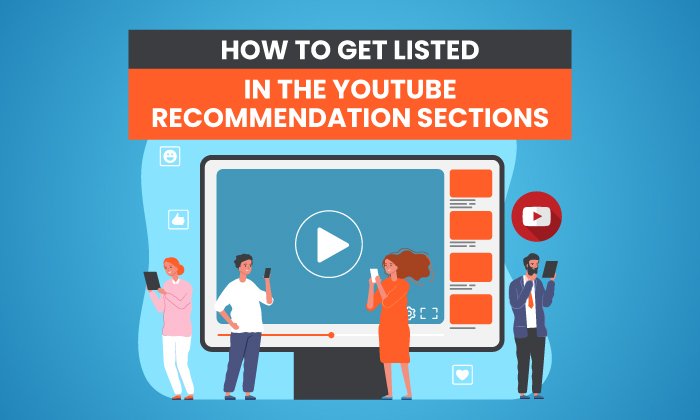
It’s widely known YouTube is the world’s second-largest search engine.
However, did you know the majority of video viewing on YouTube doesn’t actually originate from the search bar?
In fact, the video platform has confirmed its YouTube recommendation engine is responsible for more than 70 percent of the total time spent watching content on the site.
That means if you want to get more eyes on your YouTube content, it’s in your interest to understand how YouTube recommendations work.
What Is the “YouTube Recommended” Section?
As with any site, YouTube wants you to stick around for as long as possible. The more videos you watch, and the longer you watch for, the more ads it can serve you, and the more revenue it generates.
That’s precisely why the YouTube recommendation function exists. It’s designed to guide users toward content they love and actively want to watch, based on a range of factors (more on that later).
YouTube recommendations appear in two places:
- On the homepage.
- In the “up next” section alongside the video you’re already watching:
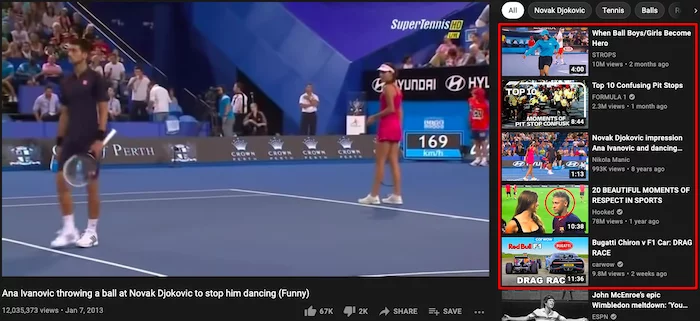
Benefits of Getting in the YouTube Recommended Sections
If your goal is to drive more video views on YouTube, it’s impossible to overstate the importance of the YouTube recommendation engine.
Whether or not they know it and understand how it works, most YouTube users make regular use of YouTube recommendations. According to a survey from Pew Research Center, 81 percent of users occasionally watch recommended videos, while 15 percent do so regularly.
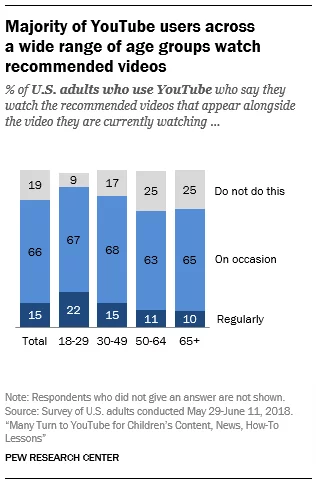
Importantly, YouTube’s audience skews younger, with 95 percent of 18 to 29-year-olds in the U.S. using the platform. Pew’s data shows us those younger users are more likely to find new content through the YouTube recommendation engine. More than one-fifth of users in that age group regularly watch recommended videos, compared to just one-tenth of users aged 65+.
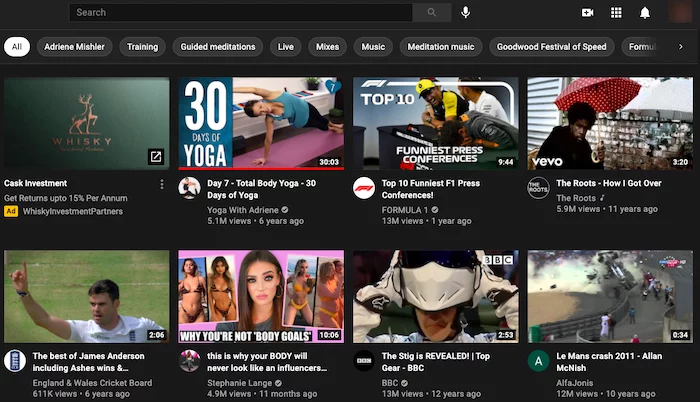
Pew Research’s study also demonstrates just how powerful a YouTube recommendation can be. It used YouTube’s API to analyze 98,508 videos recommended by the YouTube algorithm. Over the six weeks of the study, those videos saw their view counts increase by an average of 38.5 million views. One video had 34,000 views when it was first discovered by Pew and almost 30 million by the final time it was recommended.
In short, if your video is recommended by YouTube, your visibility increases exponentially.
YouTube Recommended Sections Algorithm Factors
As with Google, YouTube’s recommendation algorithm is shrouded in secrecy and is constantly tweaked and tested to deliver the most accurate and helpful results. However, we know it takes a range of signals into account, including:
- your viewing and search history (provided you have enabled them)
- your channel subscriptions
- contextual factors such as your location and the time of day
Additionally, YouTube uses a video’s retention rate, or the average percentage that people watch, as a sign of its quality. A high retention rate indicates a video is relevant, high-quality, and enjoyable, which means YouTube is happier to recommend it to other viewers.
YouTube also regularly asks users about their experiences on the platform, either in relation to individual videos or to the YouTube recommendation system in general. It uses this direct feedback to inform future algorithmic decisions in a bid to deliver the best experience.
Tips and Strategies for Getting Listed in the YouTube Recommended Sections
Just as every website owner wants to rank at the top of Google, every YouTuber wants their content to be recommended by the platform. Unfortunately, with more than 500 hours of video being uploaded to YouTube every minute, not all of them are going to succeed.
Follow these six tips to increase your chances of winning a cherished YouTube recommendation.
1. Optimize Your Metadata
YouTube’s algorithm is smart, but it isn’t human. It doesn’t literally “watch” a video and decide whether or not to recommend it. Instead, it analyzes user behavior and metadata to make intelligent decisions.
Optimizing your metadata can boost your presence in YouTube recommendations (and also in search results). Specifically, metadata optimization means focusing on your:
- video descriptions
- titles
- tags
Video Descriptions

The description is the text below your videos. As well as explaining what your content is about, it helps users find videos in the first place. Your descriptions should:
- accurately describe the video
- describe the type of content you create
- compel users to subscribe to your channel
- incorporate links to other relevant videos and playlists
Titles
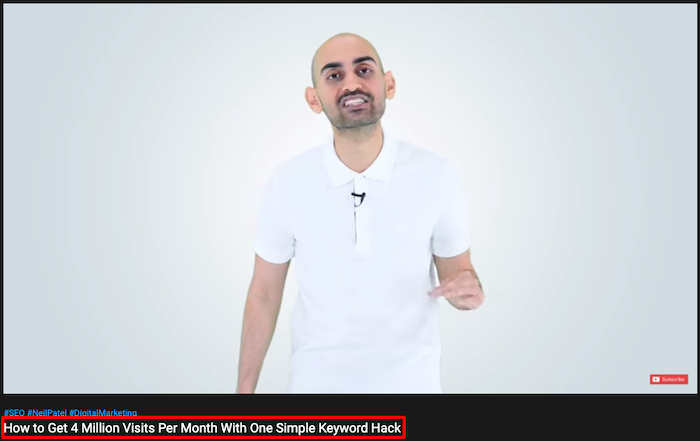
Think of the title as your video’s headline. Its job is simple: persuading people to click. To do that, it should:
- incorporate relevant keywords toward the start of the title
- accurately represent the content of your video
- include episode numbers where relevant
- be regularly updated to keep your content fresh
Tags

Tags are keywords that help people find your videos through search and recommendations. You can view a video’s tags by right-clicking on the video page, hitting “View Page Source,” and searching for “keywords.” Your tags should:
- thoroughly and accurately describe your content
- incorporate keywords from your video title
- appear in order of relevance
- fit within the 270-character limit
2. Localize Your Content
I’ve already mentioned how YouTube considers your country and time of day in deciding what content to recommend.
That means you need to create content that’s relevant to your audience’s location and optimize it to increase your chances of appearing in YouTube recommendations and search bars. To do that, ensure your content is found by localizing your video metadata.
Fortunately, localizing your metadata doesn’t require uploading multiple versions of the same video, each with a different set of descriptions, titles, and tags. Instead, you can simply do it through the YouTube user interface, or by uploading a CSV file containing your translated metadata by following these six steps:
- Download the template “Video – Localization Update” from the Content Delivery Templates page.
- Add your translated metadata to the template.
- Save the file as .csv.
- Click “Validate & Upload” in the “Content Manager” menu.
- Click “Select Files” and choose your .csv file.
- Click “Process Package”.
3. Tap Into Trending Topics
Localization isn’t just about adjusting your metadata for multiple languages; it’s also about creating content that’s relevant to audiences in the locations you want to reach.
After all, YouTube specifically uses the phrase “locally relevant news” when explaining the factors driving its YouTube recommendation engine. In short, if you create content around trending subjects that are relevant to your audience, you have a better chance of winning a YouTube recommendation.
Another Google tool can help you find those trending topics. Visit Google Trends and explore the “recently trending” section, which shows results from 47 countries. Here’s an example of how it looks for the U.S.:
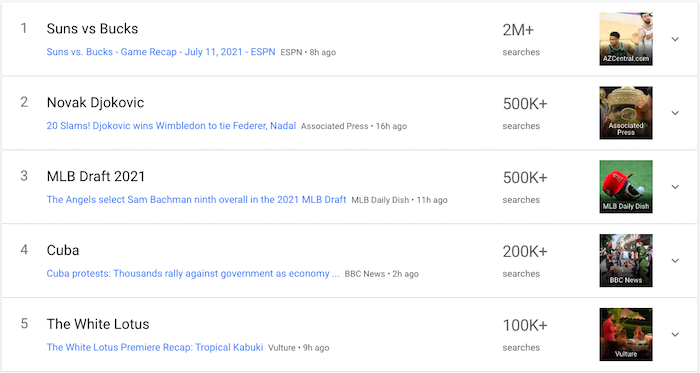
We know those are the topics American audiences were searching for on July 11. By clicking into each of those examples, we can find out even more information, such as related queries. These add further context to the search and tell us what people are interested in finding out:
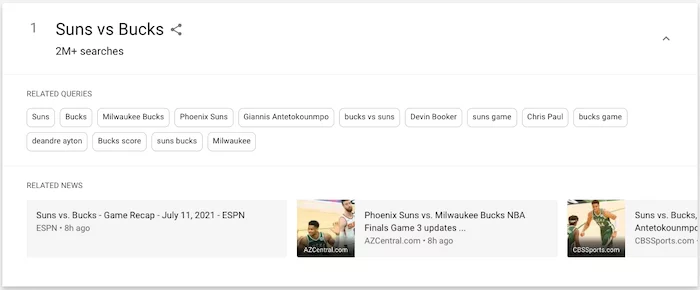
Based on this info, if you had a basketball channel, you could create a match preview focusing on key players like Devin Booker and Giannis Antetokounmpo, or a report discussing the score and highlighting key statistics.
What if those results are too top-level and you need to drill down into a specific topic? Google Trends can do that, too. Just click “Real-time Search Trends” and choose from five categories:
- Entertainment
- Health
- Sci/Tech
- Sports
- Top stories
4. Focus on Keeping the Beginning of Your Video as Engaging as Possible
Remember: an important factor in winning a YouTube recommendation is whether other people who clicked the same video watched it all the way through.
In reality, there are no guarantees people will stick around once they’ve clicked your video. One study analyzed over 56,000 YouTube views across four small but effective YouTube channels and found an average view duration of 50-60 percent of the total length. Those are comparatively high-performing channels; many see much poorer results.
What can you do to encourage your viewers to watch your videos from start to finish?
YouTube itself has long said the first 15 seconds can make or break your video. Get your audience engaged early by:
- grabbing their attention from the outset, either through eye-catching visuals or by saying something interesting or surprising
- clarifying what your video is about straight away, so viewers can be sure they’ve come to the right place
- revealing what you’ll be discussing later in the video, without giving too much away
5. Encourage Viewers to Like & Share Your Content
YouTube uses various metrics to assess and understand a video’s popularity, such as:
- click-through rate
- average view duration
- average percentage viewed
- likes and dislikes
- surveys
How does it get all that data? Well, every time a video is uploaded, YouTube serves it on the homepage for a small number of users. If they click on and engage with it by watching it to completion, sharing it, or hitting “like,” that video will appear on more homepages.
In this way, popular videos can quickly snowball. They get a bunch of views and engagement, which means they show up on more homepages, helping them to generate even more views and engagement. It’s a virtuous circle.
As such, it’s in your interest to encourage as many people to like and share your content as possible. That’s why so many YouTubers urge their audience to hit the “like” button after watching.
Additionally, bear in mind your most loyal viewers are most likely to engage with and share your content. It stands to reason someone who’s watched 20 of your videos all the way through will be more likely to share your next video than someone who’s never even heard of you before.
That’s why I often encourage people to subscribe to my channel at the end of my videos:
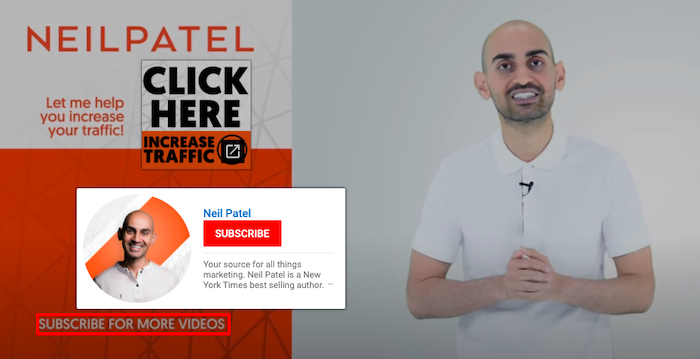
6. Upload Custom Thumbnail Images
For your videos to attract the attention of the YouTube recommendation engine, you need people to watch them. One of the best ways to do that is by adding custom thumbnails to every video you post.
The thumbnail appears in lists of video results, just above the video title, so it plays a key role in persuading people to click. While YouTube will happily auto-generate a thumbnail for you, I highly recommend making your own.
YouTube’s own figures show 90 percent of top-performing videos have custom thumbnails, and while we can’t categorically say that’s because of the thumbnail, it’s too strong a correlation to ignore.
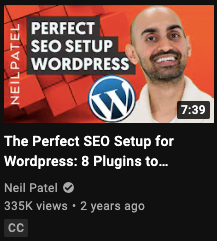
Follow these steps to create custom thumbnails that users just can’t help but click:
- consider your thumbnail image before shooting the video so you can capture multiple images
- review thumbnails for similar videos to ensure yours stands out
- make your image as high-resolution as possible, while remaining under the 2 MB limit
- bear in mind the ideal dimensions of 1280 x 720 pixels (or an aspect ratio of 16:9)
- save your thumbnail as a JPG, GIF, BMP, or PNG
One final point: to upload a custom thumbnail image, you’ll first need to verify your YouTube account.
YouTube Recommended Sections Frequently Asked Questions
Will it hurt my chances of appearing in the recommended section if my other videos haven’t received much traffic?
Probably not, but if your other videos don’t have long user retention times or engagement (such as likes and shares), there’s less chance YouTube’ll recommend them.
Will I be alerted if my video reaches a recommended section?
You are likely to notice if a video has reached a YouTube recommended section, due to a sudden boost in views or new subscribers. If a video seems to be growing and growing, it’s likely you’ve scored a top spot for your target audience.
How often does YouTube update its algorithm?
YouTube has made several major updates to its algorithm down the years, from optimizing for clicks and views, to prioritizing watch time and satisfaction. Also, bear in mind YouTube has multiple algorithms for ranking content in the different areas where videos appear, including the home page, suggested videos, and search results, all of which are regularly updated.
Where do the recommended sections appear in YouTube?
YouTube recommendations appear on the homepage and in the “up next” section.
YouTube Recommended Sections Conclusion
If you’re serious about monetizing your YouTube channel or getting a lot of views, you can’t afford to ignore the YouTube recommendation system. It’s the single biggest factor in getting people to see your videos once they’re within the YouTube platform.
Fortunately, if you’re already creating high-quality videos, you don’t need to do anything radically different to appear in a YouTube recommended section. Optimize your metadata, focus on driving engagement, and design compelling thumbnails, and you’ll give yourself the best possible chance of catching YouTube’s eye.
What tactics do you use to generate more engagement from your YouTube videos?
Did you miss our previous article...
https://consumernewsnetwork.com/technology-news/how-to-use-reddit-ads-to-generate-sales






